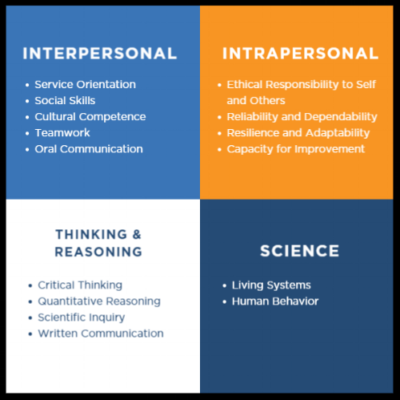The AAMC Core Competencies: What They Are and Why You Should Care
You may have never heard of the AAMC Core Competencies--but your medical school admissions coordinators have. In this article, find out what they are and why they are so important to your med school application!
The Pre-Med Standard
As pre-meds, we can be inundated with the testimonies of others and their paths to medical school. In some ways, this is very helpful, as there is much to learn from the experiences of others. At the same time, it can be easy to generalize and create a medical school meta-narrative: “Okay, so I need to get a 4.0 GPA, to get a perfect score on the MCAT, to be published in Nature, to cure an entire village’s flu outbreak, to create three clubs and a nonprofit and be president of them all, to build a hospital from the ground up with my bare hands, and get eight hours of sleep while having a hobby.”
Obviously, these are unrealistic in totality; so, what should we aspire to? What do medical schools actually expect? In the following article, I explain the Association of American Medical Colleges’ (AAMC) fifteen core competencies. These are the groups of traits that admissions committees expect to see in entering medical students. They are grouped into four categories, as seen in the graphic below.

While a list of fifteen different skills to master may seem intimidating, I hope you will be encouraged by the number you are already actively developing!
Keep in mind, this is not about checking boxes on your AMCAS application; this is about developing skills and mentalities that will make you the best doctor you can be.
Science Competencies
While it may surprise you, the smallest group of the four is the last one: Science Competencies.
- Living Systems: the ability to apply “knowledge and skill in the natural sciences to solve problems related to molecular and macro systems including biomolecules, molecules, cells, and organs”
- Human Behavior: “knowledge of the self, others, and social systems to solve problems related to the psychological, socio-cultural, and biological factors that influence health and well-being”
I’m sure it is apparent that these are some of the main topics on the MCAT. In fact, your MCAT score will serve as a strong indicator of your proficiency in these competencies, as will your grades in biology, chemistry, psychology, and other STEM-related classes. The Science Competencies are knowledge-based, meaning they can be directly tested. This is not true for the rest of the competencies.
Thinking and Reasoning Competencies
Similar to the Science Competencies, the Thinking and Reasoning Competencies are academic in nature. However, unlike the former, Thinking and Reasoning Competencies are less knowledge-based and more reasoning-based. (Perhaps this is unsurprising, given the name.) They include:
- Critical Thinking: using “logic and reasoning to identify the strengths and weaknesses of alternative solutions”
- Quantitative Reasoning: the capacity to apply “quantitative reasoning and appropriate mathematics to describe or explain phenomena in the natural world”
- Scientific Inquiry: the ability to solve scientific problems, to be comfortable in scientific discourse, and to understand how scientific knowledge is acquired
- Written Communication: the ability to “effectively [convey] information to others using written words and sentences”
As you may know, many of these competencies are also tested through the MCAT. Critical Thinking will be featured in the CARS section, and Quantitative Thinking will be present all throughout.
The latter two sections are perhaps more ambiguous. How do I develop my capacity for Scientific Inquiry? How do I know if I’m proficient in Written Communication? Undergraduate research can enable you to develop these skills. Your success as a scientist will act as a bellwether of your competency in Scientific Inquiry, and the process of writing and (hopefully!) publishing a paper will demonstrate your capacity for Written Communication.
Of course, there are other ways to show your competency in these areas. Teaching, for example, will show your ability to communicate how scientific knowledge is acquired and how to use it to solve problems. Additionally, your personal statement on your application will be a great place to highlight your Written Communication skills, and you can discuss your scientific interests in interviews.
It goes without saying: there is so much more to being a doctor than mastery of science and math.
Intrapersonal Competencies
As we all know, there’s so much more to being a doctor than just science and math. Being a doctor means having good “bedside manner,” and displaying other important “soft” skills. The AAMC breaks these down into two categories: Intrapersonal and Interpersonal Competencies. The former deals with the values of a doctor; the latter concerns a doctor’s comportment.
Intrapersonal competencies are:
- Ethical Responsibility to Self and Others: a display of ethics, honesty, integrity, and moral strength
- Reliability and Dependability: “[fulfilling] obligations in a timely and satisfactory manner; [taking] responsibility for personal actions and performance”
- Resilience and Adaptability: the ability to tolerate and adapt to stressful/changing situations and to persist through setbacks
- Capacity for Improvement: the pursuit of continuous improvement, self-reflection for the sake of development, and the use of feedback for self-betterment
Many of your extracurriculars can attest to these competencies. A part-time job can enable you to develop Reliability and Dependability; your essays and letters of recommendation can discuss your Resilience and Adaptability, as well as Capacity for Improvement (the two often go hand-in-hand). As for your ethical responsibility, this is something that can shine through in interviews, especially if the interview style is the Multiple Mini Interview (MMI) model. (See more about how to answer ethics-based MMI questions here!)
If you want to develop these traits further, look into working in a clinical setting. Clinical experience can be shadowing, working as an EMT, scribing, working as a medical assistant, and basically anything that puts you in the shoes of a medical professional.
Clinical experience will allow you to observe those who already possess these skills, and will provide you with the opportunity to grow: working as an EMT can teach you adaptability; working as a scribe can help you become more reliable; shadowing can expose you to important ethical questions; medical assistantship can provide you with opportunities to solicit feedback and build your skill set. Of course, these are only a few instances — any type of clinical experience can help develop new skill sets.
Interpersonal Competencies
The final set of competencies is the Interpersonal Competencies category. Doctors work with people: other doctors, nurses, pharmacists, and — above all — patients. I can’t speak for everyone, but this is part of what drew me to medicine! Perhaps because of the degree to which interpersonal skills are necessary in medicine, the Interpersonal Competencies category is the largest of the four:
- Service Orientation: a will to serve at both the individual and societal level
- Social Skills: an “awareness of others’ needs, goals, feelings” and “[adjusting] behaviors appropriately in response to these cues”
- Cultural Competence: engaging and seeking to understand diverse perspectives to further advance your ability to properly serve multicultural populations
- Teamwork: the ability to work collaboratively and place the team’s goals ahead of your own
- Oral Communication: more than just speaking clearly, this includes listening well and anticipating (and overcoming) communication barriers
You can develop many of these in your extracurricular activities. If you volunteer at a hospital, this can serve as testament to your skills in nearly all the above. Additionally, outreach clubs can demonstrate your Service Orientation and Teamwork as well as (depending on the nature of the club) any/all of the other competencies. Ways to further develop your competencies in this category include service clubs and volunteer work, especially with underserved populations. It also helps to learn languages, especially Spanish. These activities will help you become stronger in the Interpersonal Competencies (and show it).
Clinical experience, extra-curricular activities, internships and volunteering are wonderful ways to develop and demonstrate the core competencies. Intentional practice is key.
Conclusion
In this article, I’ve listed the Fifteen Core Competencies that the AAMC looks for in future physicians. They are:
Going through this list, I’m sure you already demonstrate proficiency in many of the above. For the others, take some time to learn and improve! Keep in mind, this is not about checking boxes on your AMCAS application; this is about developing skills and mentalities that will make you the best doctor you can be.
So, before you start worrying about how you haven’t already cured cancer or transformed a village, remember that medical schools aren’t looking for saviors, they’re looking for doctors. Continue to pursue what you do well, examine the competencies you need to develop further, and get to work on becoming the best MD you can be.




